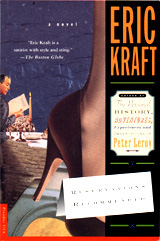
YOU CAN READ
|
“Matthew!” says Effie, just as loudly as he did. “What’s happening with that woman who spent her rent money for tuition?” “Oh. Didi.” She looks at Jack and at Belinda and says, by way of explanation, “I’m defending a woman who was being evicted from a housing project because she hadn’t paid her rent for two months. In fact, she had paid part of it, but not all of it. She spent the rest to pay a tuition bill. How did you know, Matthew?” “I saw the article in the Globe.” “Oh,” says Effie. “It was a while ago,” she says to the others. “She was ambitious. She enrolled in a couple of courses at the Harvard extension school, and she was about to be evicted because she’d stretched her budget a little too far. You know, she had been so foolish as to spend her rent money on her future. Well, she tried to explain that she would catch up over the next couple of months. They ignored her. She called Legal Aid. I got the case.” “And bingo!” says Richard. “The woman’s all over the papers!” Matthew remembers. For a week or more she was always there, sometimes beaming, sometimes sniffling, an attractive black woman, with darling Effie by her side, the little guys against the heartless bureaucracy. Now, sitting here at Flynn’s, smiling at Effie while she goes on, recounting her struggles, he remembers reading the story, remembers the circumstances exactly. He was sitting alone in his living room, after work, drinking a martini. He thought of doing something for the woman, sending her some money. He must have been on his second martini. She only needed a couple of hundred dollars to make up the back rent she owed. It would have been simple to write out a check, and Matthew would hardly have noticed the money, but he put the newspaper aside and began pacing the floor, drinking, thinking. He began thinking beyond this one woman, he— Uh-oh. Matthew is about to speak. The urge to speak has come upon him, and he’s a little too drunk to fight it. “You know,” he says in a tone that announces his intention to say something important, interrupting Effie, “I remember reading the story about that woman. In the Globe. I remember the circumstances exactly. I was sitting alone in my living room, reading the paper. And when I read that story, it just struck me that she only needed a couple of hundred dollars. It just struck me. So little. I put the paper aside and started pacing the floor.” For a terrifying moment, Matthew realizes that he’s about to get up out of his chair and demonstrate this pacing; to his relief, this passes. “I began thinking. Beyond this one woman, you know. To the struggles, the terribly hard time that I know so many people have.” Jesus, I sound like an idiot, he thinks. “Just getting by, of course. But more than that. Breaking through! Getting out of a pattern of poverty and failure. I wondered how many of them could do it, break out, for just a couple of hundred dollars. You know what I mean?” This question is answered with grave noddings of the head. “Somebody wants to open a little shop or start some small-scale business. Doing landscape work or something like that. All he needs is a couple hundred dollars. To get started. And so I came up with this idea. We give poor people two hundred dollars apiece. No questions asked.” He makes a sweeping gesture with his hands, brushing aside the questions. “Some of them just spend it. So what? It goes right back into the economy, doesn’t it? Some of them just stick it into the bank. So what? It’s available for loans. But some of them use it to start small businesses. Somebody in a ghetto where banks don’t want to open up starts a small bank. You know, on the scale of a check-cashing service, something like that. Another guy opens—oh, I don’t know—a shoe-repair business. All these people need supplies, right?” They nod with some enthusiasm. They are a kind bunch, indulgent. These people are my pals. “Pens and deposit slips for the little street-corner bank. Pieces of leather and rags and polish and tools for the shoe shop. They buy this stuff. They’re fueling the economy, right?” Matthew pauses; he liked the nodding earlier, the little smiles, and he’s asking for more of that. His pals give it to him. “And then when their little businesses begin making money, they begin spending it. They buy better cuts of meat. Flowers for the wife. Shoes for the kids. Toys for the kids. Beer imported from Denver, for Christ’s sake.” Matthew stops here, thanks to some residual self-censorship, but at home, when he had read the article, when he was alone, he ran on with the impressive logic of his idea. He wondered why no one had seen this logic before. Why hadn’t anyone understood that if the poor had money, everyone would be better off? He began running that over in his mind, making a slogan out of it. If the poor had money, everybody would have money.He laughed at himself. This must be an incredibly naïve idea, he thought. Not the idea of a grownup. A child’s idea. He made himself some dinner. He watched a movie while he ate. He had another drink. By the time he went to bed he had lost the urge to send some money to the woman Effie was defending. He even felt a little foolish for having thought of doing it. It no longer seemed like what an intelligent, thinking adult would do with his money. It was what a kid would do. However, he had not quite forgotten the woman’s plight. He had incorporated it into a new bedtime fantasy. In this one he did send a check, to Effie, for the woman, a large check, and he asked Effie to dole the money out on a monthly basis over the next year, while the woman was finishing school, with the stipulation that her benefactor was to remain unknown to her. He derived an almost tactile pleasure from the thought of writing benefactor and meaning himself. When Effie called to thank him, he suggested lunch or dinner. She said, “I’d love that,” in a voice that was oddly hushed, as if she were embarrassed that he had read her mind, at last, after all these years. There is a moment of silence at the table after Matthew finishes outlining his proposal. Then Jack says, slowly, very seriously, nodding as he speaks, “You know, Matthew—” He draws a breath, grimaces as if with the gravity of the moment. “You are shitfaced. I mean, you are really drunk.” Laughter. Matthew joins it, and he makes a show of pushing his glass away. “So, Effie,” says Jack, “what was the upshot of the whole thing?” “Nothing,” says Effie. “Zero upshot. The story in the Globe brought in some money. Not a fortune, but enough. She paid her back rent, and the agency let the matter drop.” “Good,” Matthew says. “Good.” He’s aware of what he’s doing, and he’s aware that he ought to be ashamed of himself for doing it, but he’s doing it anyway: nodding and smiling in a way that suggests he was one of the people who sent money. He thinks of saying something more. He can imagine himself saying just a little something more, something like “That’s what I hoped,” and before he can stop himself he has said it. Sometimes, he thinks, my mind is my worst enemy. Effie looks at him with a quizzical grin that quickly widens into a smile. Matthew should feel like shit, but he doesn’t, not at all. He basks in that smile. “Matthew,” Effie says, drawing his name out. “You doll.” He raises his hand, shrugs, frowns a little, all to say, “It was nothing.” Which, of course, it was. |
 |
||
|
RESERVATIONS
RECOMMENDED | CHAPTER 2, PART 7 | CONTENTS
PAGE
|

 Here
are a couple of swell ideas from Eric Kraft's vivacious publicist, Candi
Lee Manning:
Here
are a couple of swell ideas from Eric Kraft's vivacious publicist, Candi
Lee Manning:
